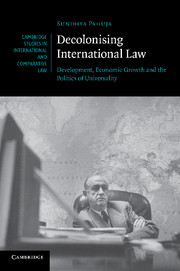Book contents
- Frontmatter
- Contents
- Acknowledgements
- 1 Introduction
- 2 Inaugurating a new rationality
- 3 From decolonisation to developmental nation state
- 4 From permanent sovereignty to investor protection
- 5 Development and the rule of (international) law
- 6 Conclusion
- Appendix One A note on the use of ‘Third World’
- Appendix Two Harry Truman – Inaugural Address
- Bibliography
- Index
- cambridge studies in international and comparative law
- References
4 - From permanent sovereignty to investor protection
Published online by Cambridge University Press: 07 October 2011
- Frontmatter
- Contents
- Acknowledgements
- 1 Introduction
- 2 Inaugurating a new rationality
- 3 From decolonisation to developmental nation state
- 4 From permanent sovereignty to investor protection
- 5 Development and the rule of (international) law
- 6 Conclusion
- Appendix One A note on the use of ‘Third World’
- Appendix Two Harry Truman – Inaugural Address
- Bibliography
- Index
- cambridge studies in international and comparative law
- References
Summary
Introduction
Beginning in the 1950s, and continuing throughout the 1960s, the Third World launched an initiative claiming Permanent Sovereignty over Natural Resources (PSNR). The claim is usually understood as having made little headway in achieving its own objectives of asserting control over the assets and economies of the Third World. The story of PSNR is commonly told in the same breath as the demands for a New International Economic Order (NIEO) and the conventional account of its failure binds the two together inextricably. The story usually narrates: an excessively radical set of demands which briefly took flight on the international stage due to an economic boom in the North; a concomitant rise in commodity prices; a brief moment of Third World unity brought on by the oil crisis; and, finally, a consequent sense of vulnerability in (some of) the North. However, as commodity prices revealed themselves to be cyclical rather than ascending, the solidarity between the oil producers and the non-oil producers soon dissolved. In addition, cartels in relation to non-oil commodities proved to be difficult to form and, so the story goes, the feelings of vulnerability in the North diminished. The shouts of discontent became less audible and finally the economic tidal wave of the debt crisis drowned the last few voices out altogether.
In some respects the conventional story outlined above is illuminating – particularly in regard to what may have produced the conditions in which the Third World’s demands could initially be heard. However, it is instructive to reread the demands for PSNR, and the responses to those demands from the industrialised states, in the context of wider developments in the doctrines and institutions of both public international law and international economic law. The point is not to rehearse yet another version of the argument that the Third World was misguided, unlucky and ultimately not sufficiently unified in its demands or subsequent strategy. Instead, the episode may be understood heuristically in relation to our argument here, which is as a telling instance of the way in which a certain set of values – and therefore particular interests – triumph in international law through the elevation of those values to the status of ‘universal’. Once elevated, those values are then stabilised in that ‘universal’ position through a dynamic that constantly recharacterises and displaces issues from the political to the economic institutions of international law, or vice versa.
- Type
- Chapter
- Information
- Decolonising International LawDevelopment, Economic Growth and the Politics of Universality, pp. 95 - 171Publisher: Cambridge University PressPrint publication year: 2011
References
- 1
- Cited by



